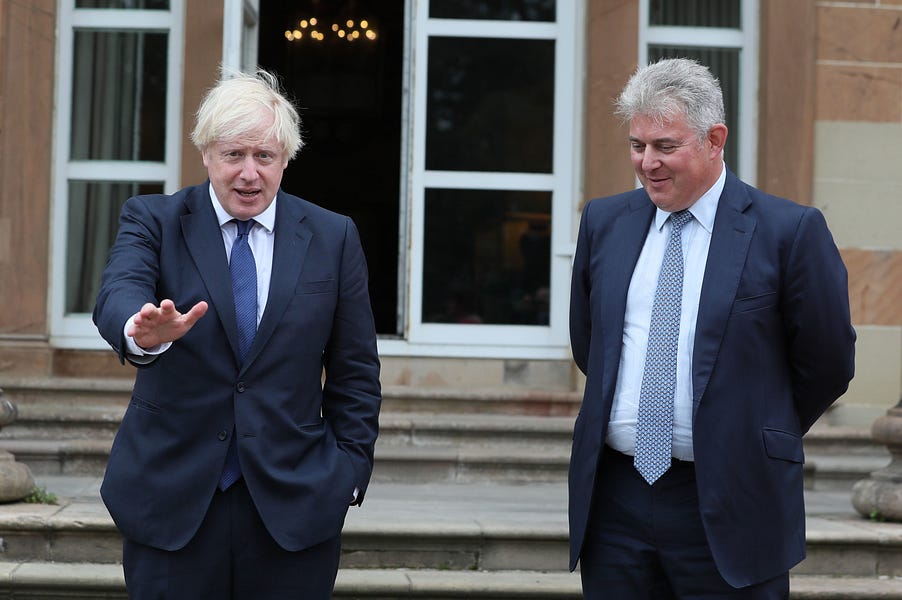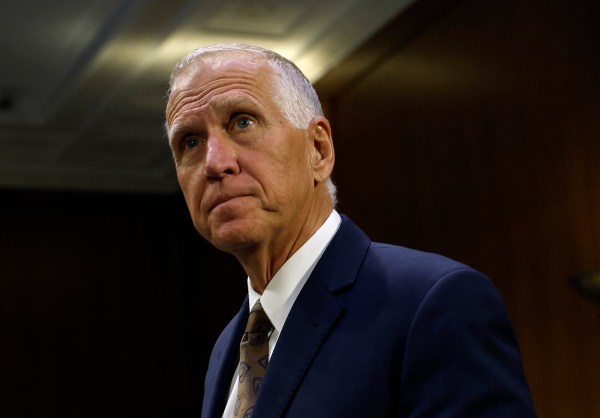The U.K. is coming up on a hard deadline in its departure from the European Union, and like any messy divorce, things are getting heated.
Technically, “Brexit” was official on January 31, but the withdrawal deal stipulated an 11-month transition to allow the two sides to negotiate their future relationship. With the transition period ending on December 31—and no further opportunity to extend that deadline, the last chance to do so having passed in June—there are still several contentious points to work out, especially regarding Northern Ireland.
Right now, the British government is signaling its willingness to violate international law by attempting to pass a law, called the Internal Market Bill, that would override three parts of the United Kingdom’s withdrawal agreement with the EU: the requirement of customs checks on goods passing from Northern Ireland into Britain, restrictions on state subsidies to favored industries, and the application of EU judicial decisions (known as direct effect) in Northern Ireland.
In remarks addressed to the House of Commons on Tuesday, Northern Ireland Secretary Brandon Lewis spoke about a new bill the government plans to unveil: “Yes, this does break international law in a very specific and limited way. We’re taking the powers to disapply the EU law concept of direct effect … in a certain very tightly defined circumstance.”
How did the parties get here? Prime Minister Boris Johnson’s Tory government, elected on a promise to “get Brexit done,” is attempting to tough out stalling negotiations with the EU over the transition. No deal by December 31 would mean a “hard exit,” wherein Britain would start trading with the EU by standard World Trade Organization rules..
Some Tory backbenchers have indicated that the unilateral breach of an international treaty might cause them to vote against the bill, although not in numbers significant enough to threaten Johnson’s government. The government’s top legal civil servant, Jonathan Joseph, resigned Tuesday after disagreeing with the decision to publish the bill.
Ever since the initial Brexit vote, the status of Northern Ireland has been a major source of contention in negotiations. As the only part of the United Kingdom that has a land border with the EU, Northern Ireland was designated in the 2019 withdrawal agreement as a de jure part of the EU, adhering to European rules on issues like state subsidies and safety standards. The region would, however, remain in the U.K. customs zone under the agreement, requiring customs checks on goods going from Northern Ireland into the rest of the country. This potential state of affairs angers Northern Irish Unionists, as it would further separate the six counties from Britain, bringing them closer to the Republic. Johnson recently declared that there would only be a border in the Irish Sea “over my dead body.”
The new bill would override some of these rules and customs checks. It would also threaten to reinstate a “hard border” between Northern Ireland and the Republic of Ireland—potentially bringing back the security checkpoints and customs outposts removed as part of the 1998 Good Friday peace treaty, albeit in a much reduced form.
But Northern Ireland is not the only issue holding up trade negotiations. Economically marginal but politically significant rules over EU access to Britain’s fisheries have been a sticking point between Britain and France, and Europe is determined to block British attempts to promote favored industries, like tax benefits to entice production in deindustrialized areas and technology subsidies.
Much of the press has portrayed Johnson’s latest move as a kind of brinksmanship, that dares the EU to blink before Johnson’s declared October 15 deadline for reaching a deal. If no deal is reached by then, the U.K. will exit without a trade deal, or “trading on Australian terms,” as the Johnson government terms it.
For its part, the EU issued an ultimatum Thursday, stating that the U.K. must withdraw the bill “by the end of the month” or risk legal action and the scuppering of trade talks.
But Stan Vueger, an analyst at the American Enterprise Institute (who has contributed to The Dispatch in the past), thinks the bill is “yet another step in [the United Kingdom] drifting towards a complete hard exit.” He noted that the EU “can’t change the fundamental principles of their legal structure just to accommodate whatever mood shifts the British government has any given day,” and so will be unable to accommodate a legal situation that essentially makes Northern Ireland the U.K.’s backdoor into the common market. There must be a hard border somewhere, even if the Johnson government does not want to admit it.
So if the latest move is a sign that a near-term trade deal is unlikely, what would trading on Australian terms really look like? Most importantly, Britain would immediately assume higher tariffs than it currently has with the EU. For its part, Australia is actually in the midst of negotiating a new trade agreement with Europe, hoping to improve on the current WTO terms.)
Vueger noted that “these things are hard to observe in real time,” beyond some initial supply-chain snarls as new tariffs suddenly spring into place.
The real costs are marginal, and take effect over time: slightly higher prices for British consumers, European and international firms no longer considering the U.K. as a site for new offices or factories, and—most economically damaging—an exodus of low-skilled workers mostly hailing from Eastern Europe and high-skilled immigrants from throughout the Union. As Vueger observed, somewhat tongue-in-cheek, “probably half of the economics department” of Oxford University hails from continental Europe. The end result of a crash-out, he said, would be continuing negotiations resulting in “Australian terms with lower tariffs.”
Passage of the Internal Market Bill could also harm U.S.-U.K. trade: Speaker Nancy Pelosi has threatened that any undermining of the Good Friday agreement would mean that “there would be absolutely no chance of a U.S.-U.K. trade agreement passing the Congress.”
Johnson’s government would most likely not be imperiled by a no-deal exit, as sufficient numbers of his large parliamentary majority are committed Brexiteers, trade deal or no. But the irreconcilable tensions in his negotiations over trade highlight the tensions in his own pitch to British voters. The Tory government wants the freedom to funnel state aid toward its preferred industries, especially in the de-industrialized “blue Labour” districts that gave them their majority. But state aid cannot help much if Britain has restricted access to the European market, access which is contingent on … Britain abiding by EU rules on state aid.
Johnson, who argued for Brexit as the beginning of a dynamic “Global Britain,” made his name as a member of the decidedly neoliberal Leave faction. These Leavers, who supported Brexit as a way to increase economic competitiveness along with British sovereignty, look increasingly mistaken, as their argument was always at least somewhat dependent on preferential access to the common market.
Johnson, like Theresa May before him, has been unable to untie the British Gordian knot: The desire to have access to the common market along with the ability to set their own economic and immigration rules. Increasingly, it seems like Britain will be forced to concede the former to achieve the latter, a sign of what were really the most powerful forces behind the Leave campaign’s victory.
Photograph by Brian Lawless/WPA/Getty Images.







Please note that we at The Dispatch hold ourselves, our work, and our commenters to a higher standard than other places on the internet. We welcome comments that foster genuine debate or discussion—including comments critical of us or our work—but responses that include ad hominem attacks on fellow Dispatch members or are intended to stoke fear and anger may be moderated.
With your membership, you only have the ability to comment on The Morning Dispatch articles. Consider upgrading to join the conversation everywhere.